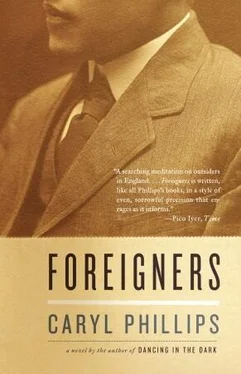There were others whose opinions of the negro were not so generous. Some intimates of the doctor's circle freely expressed their conviction that Francis Barber was, to their minds, a wastrel, a man who considered his master's needs only as an afterthought, and who was wont to freely spend the doctor's money in order that he might improve his own situation. My limited experience with Francis Barber rendered me incapable of passing an informed judgement on this matter, but to my eyes the negro Francis loved his master with virtuous affection and was always protective and loyal to the man under whose roof he had spent the greater part of his life. After all, his master had been a great champion of the negro people, and he had loudly expressed his opinion that slavery could never be considered the natural condition of man. Furthermore, the doctor had consistently thundered that the number of black men who still repined under English cruelty, at home and abroad, remained too great. But dissenting voices could be heard, and chief among the negro-detractors, and Francis Barber in particular, was Sir John Hawkins, the chief executor of the doctor's will. This peacock of a gentleman was known to hold an ungenerous impression of his fellow man, be they black or white, but it particularly galled him that during the doctor's life he was never able to dislodge Francis Barber from his high position in Dr Johnson's affection. And now, no doubt due to Sir John Hawkins' scheming, within three days of his master's decease here was Francis Barber riding in the last of the eight carriages rather than at the head of the procession where he rightfully belonged and, no doubt, where his late master would have insisted that he position himself.
Sad to say, I soon discerned that in the carriage there was an odour, and a not altogether agreeable one at that. Although I refrained from casting any accusative glances, it was clear that the negro, Francis Barber, was the source of the unpleasantness. Our third companion, who could hardly boast that he was the most hygienic creature in the kingdom, visibly recoiled at the smell and quickly fastened a handkerchief to his face. I soon realised that it was not the clothes of Francis Barber that were unwashed and troubling to the senses, but in all likelihood it was the badly matted wig that was causing the unfortunate aroma. Clearly the negro's wig had lain unattended and unpowdered for quite some time and the negro had most likely hastily snatched it up for the occasion. Despite my discomfort, I was prepared to forgive Francis Barber, for his late master had not provided him with a reliable example. The doctor's own great bushy wig possessed a hedge-like mass which suggested that a comb had never penetrated its interior, and this chaotic mess no doubt served as the negro's model for what was acceptable in a headpiece. Sensing my eyes upon him, the humble negro continued to stare intently at the floor of the carriage, as though reading some secret message that had been laid out there for him. Eventually, he raised his black eyes so that they met my own, and then he spoke in a clear English voice.
'I am sorry that we should meet again in such unfortunate circumstances.'
I smiled, and nodded slightly, as I replied.
'Indeed, the timing is unfortunate, but I am content to once again make your acquaintance.'
This being said, Francis Barber extended his hand and we shook firmly like two merchants sealing a trading deal, but beyond this opening exchange it was unclear where this conversation might ramble. Accordingly, we retreated to silence and joined our third companion in gazing idly out of the window as London occupied herself with the trifles of daily business, as though unaware of the fact that this day held significance that England would evermore be obliged to note. I thought about 'Dictionary Johnson' and the busy society tongues that were wagging with news of the recent autopsy that had been conducted at William Hunter's School of Anatomy, off Shaftesbury Avenue, where it had been discovered that although the doctor's liver, pancreas, and kidney were chronically diseased, the heart remained both large and strong. I would have liked to engage Francis Barber on the subject of this news, and discover his opinion of its significance, but the negro and I spent the remainder of our journey studiously ignoring one another until our procession reached the west door of Westminster Abbey, which it did at a little before one o'clock. Prior to disembarking I peered through the carriage window and was alarmed to see few members of the general public, and little evidence that more would soon be arriving to swell the numbers. But even as I looked on I could hear the fierce voice of England's great lexicographer reminding me that such worries were pure vanity, and that I should be putting my educated mind to better use.
The carriage door was opened by the tall footman, and a sudden rush of fresh air served only to remind me of the malodorous conditions that I had been forced to endure. The third man quickly took his leave, but Francis Barber deferred to myself and, keen to achieve terra firma and the ability to breathe freely, I seized the proffered opportunity and stepped nimbly from the carriage. The six stern-faced prebendaries of the abbey were there to greet us in their surplices and doctors' hoods, and they marshalled the newly arrived congregants into some semblance of order with the two vergers at the head, followed by the Revds Mr Strahan and Mr Butt, and then the body of the deceased on the sturdy shoulders of the six resolute pall-bearers. The rest of us followed, two by two, behind Sir Joshua Reynolds, the designated chief mourner, and his fellow executors, Sir John Hawkins, and Dr Scott. We proceeded slowly into the woefully empty abbey, and made our way to the south cross where the body was carefully placed with the feet opposite the elegant monument to William Shakespeare. Then, to the surprise of nearly all gathered, the Revd Dr Taylor began to perform what was clearly a simple burial service, not the full service that we were expecting. I later discovered that the executors had felt themselves justified in keeping the expense of the interment modest, and of course they intended no disrespect, but the general feeling of those assembled was one of distress that things were passing so quickly and without lights, music, or a little gaiety. It was noticeable that, once the initial shock had penetrated, some mourners glared disapprovingly at the presiding Dr Taylor, for most of those present held him responsible for the hurried manner in which England's greatest literary figure was being given body room in the abbey. Sad to say, the ceremony was as dull as it was rapid, and it was disturbing to realise how strikingly it differed from the extravagant service that had been held for the doctor's lifelong friend David Garrick, who five years earlier had made his rest at the same venue.
During the proceedings I sat across the aisle from Francis Barber, who perched uncomfortably with his head bowed and who appeared to be genuinely consumed with grief. It was noticeable that few chose to sit near to him, but having shared a carriage with the said person I fully understood that the reason for their reluctance had precious little to do with his sooty complexion and everything to do with the human sensation of smell. I looked at this unmoored man, who had undoubtedly lost a champion and a defender, for all of Johnson's circle knew that they should never speak ill of Francis Barber while in the doctor's presence, but the sad negro had lost more than perhaps even he had imagined. He had lost his father and his anchor in this world, and although I understood that these days Francis now possessed some version of a wife and a family, sitting quietly by himself in Westminster Abbey this poor man looked to all intent and purpose as though he was suddenly alone in the world.
Читать дальше











![Unknown - [Carly Phillips] The Bachelor (The Chandler Brothe(Bookos.org) (1)](/books/174132/unknown-carly-phillips-the-bachelor-the-chandle-thumb.webp)
